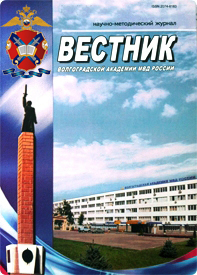The article is devoted to one of the reasons for forced termination of the ownership. The author of the article concludes that confiscation is said to be of interdisciplinary nature and possesses specific characteristics depending on the scope of the legal regulation and application. The purpose of the civil law confiscation is the necessity to resolve the property turnover as regards the forced seizure of property as a sanction for an offense or a crime committed. The author attempted to systematize the available scientific literature points of view on the concept and purpose of the confiscation to consider the innovative approach to the legal institutions and to improve the efficiency of the current system in terms of the forced termination of the ownership. Today when the legislator is paying attention to such legal institution as forced termination of ownership more often increasing the number of bases it is very important to develop an effective legislation in the sphere of ownership relations and to give them stability, assurance and security as well as to grant possibility to mobilize (involve) foreign investors.
ownership, forced seizure, confiscation, civil law liability, sanction, offense
1. Pogosova Z. M. Sootnoshenie ugolovnogo i grazhdanskogo prava v doktrine SShA: Institut Punitive Sanctions // Zakon. 2013. № 8. S. 79-88.
2. Grazhdanskoe pravo Rossii. Obschaya chast': uchebnik / A. P. Anisimov, A. Ya. Ryzhenkov, S. A. Charkin; pod obsch. red. A. Ya. Ryzhenkova. M.: Yurayt, 2011.
3. Postateynyy kommentariy k Grazhdanskomu kodeksu Rossiyskoy Federacii. Ch. 1 / pod red. P. V. Krasheninnikova. Dostup iz sprav.-pravovoy sistemy «Konsul'tantPlyus».
4. Klebanov L. R. Konfiskaciya nedvizhimyh pamyatnikov istorii i kul'tury kak sredstvo gosudarstvennogo kontrolya za sohrannost'yu kul'turnyh cennostey // Zakony Rossii: opyt, analiz, praktika. 2010. № 10. S. 42-48.
5. Karhalev D. I. Konfiskacionnye ohranitel'nye pravootnosheniya // Notarius. 2010. № 4. S. 9-10.
6. Po zhalobe grazhdanki Aminovoy Zinaidy Anatol'evny na narushenie ee konstitucionnyh prav st. 156 i 199 Kodeksa RSFSR ob administrativnyh pravonarusheniyah i p. 2 st. 243 Grazhdanskogo kodeksa Rossiyskoy Federacii: opredelenie Konstitucionnogo Suda RF ot 14 dekabrya 2000 g. № 284-O. Dostup iz sprav.-pravovoy sistemy «Konsul'tantPlyus».
7. Ugolovnyy kodeks Rossiyskoy Federacii ot 13 iyunya 1996 g. № 63-FZ (v red. ot 30.12.2015) // SZ RF. 1996. № 25. St. 2954.
8. Golovanova I. A. Konfiskaciya kak reakciya na korystnoe prestuplenie // Zhurnal ros. prava. 2015. № 7. S. 78-86.
9. Cit. po: Romanec Yu. V. Sdelki, protivnye osnovam pravoporyadka i nravstvennosti (eticheskiy i pravovoy aspekty) // Vestnik grazhdanskogo prava. 2009. № 2. S. 188, 189.
10. Zhelonkin S. S. Konfiskacionnye posledstviya antisocial'nyh sdelok: sootnoshenie chastnyh i publichnyh interesov // Arbitrazhnyy i grazhdanskiy process. 2012. № 10. S. 15-18.
11. Latyncev A. V. O sovershenstvovanii pravovyh mehanizmov konfiskacii, unichtozheniya i utilizacii iz'yatyh pischevyh produktov i syr'ya // Zhurnal ros. prava. 2011. № 4. S. 63-72.
12. Butenko A. A. Problemy grazhdansko-pravovogo regulirovaniya obschestvennyh otnosheniy po zaschite interesov dobrosovestnogo priobretatelya // Vestnik Volgogradskoy akademii MVD Rossii. 2014. № 3 (30). S. 36-39.









